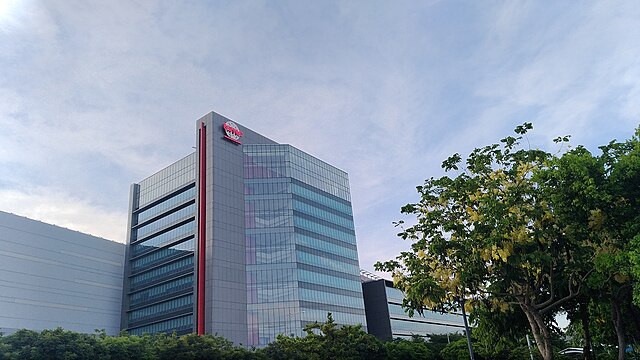Taiwan Semiconductor Manufacturing Co. (TSMC) is encountering significant hurdles in its effort to bring advanced chip production to its new $65 billion Arizona facilities. CEO C.C. Wei highlighted that compliance issues, local construction regulations, and extensive permitting requirements have doubled the project’s timeline compared to Taiwan.
Wei noted at a National Taiwan University event that every construction step requires permits, further complicating efforts to deploy cutting-edge technology in the U.S. before Taiwan. Despite these delays, Wei expressed confidence in producing chips of the same quality in Arizona, with a smooth ramp-up expected.
TSMC, the leading producer of advanced chips used by Apple and Nvidia, has emphasized that the majority of its advanced manufacturing will remain in Taiwan. The company cited supply chain gaps, a shortage of skilled workers, and U.S. regulatory complexities as factors impacting its Arizona project. For example, establishing 18,000 rules to meet local requirements cost $35 million. Additionally, chemical supply costs in the U.S. are five times higher, requiring TSMC to import sulfuric acid from Taiwan.
Labor shortages have also posed challenges, forcing TSMC to bring in workers from Texas to Arizona, further increasing costs. Despite these obstacles, U.S. Commerce Secretary Gina Raimondo announced that TSMC has started producing 4-nanometer chips in Arizona, a key milestone in the Biden administration’s efforts to boost domestic semiconductor production.
The U.S. government has supported TSMC’s investment with a $6.6 billion grant, aiming to reduce dependency on Asian manufacturing and mitigate geopolitical risks. However, TSMC reiterated that Taiwan would remain the hub for its most advanced chip technologies.



 Prudential Financial Reports Higher Q4 Profit on Strong Underwriting and Investment Gains
Prudential Financial Reports Higher Q4 Profit on Strong Underwriting and Investment Gains  Elon Musk’s Empire: SpaceX, Tesla, and xAI Merger Talks Spark Investor Debate
Elon Musk’s Empire: SpaceX, Tesla, and xAI Merger Talks Spark Investor Debate  Alphabet’s Massive AI Spending Surge Signals Confidence in Google’s Growth Engine
Alphabet’s Massive AI Spending Surge Signals Confidence in Google’s Growth Engine  Global PC Makers Eye Chinese Memory Chip Suppliers Amid Ongoing Supply Crunch
Global PC Makers Eye Chinese Memory Chip Suppliers Amid Ongoing Supply Crunch  FDA Targets Hims & Hers Over $49 Weight-Loss Pill, Raising Legal and Safety Concerns
FDA Targets Hims & Hers Over $49 Weight-Loss Pill, Raising Legal and Safety Concerns  SpaceX Seeks FCC Approval for Massive Solar-Powered Satellite Network to Support AI Data Centers
SpaceX Seeks FCC Approval for Massive Solar-Powered Satellite Network to Support AI Data Centers  Nvidia Nears $20 Billion OpenAI Investment as AI Funding Race Intensifies
Nvidia Nears $20 Billion OpenAI Investment as AI Funding Race Intensifies  Nintendo Shares Slide After Earnings Miss Raises Switch 2 Margin Concerns
Nintendo Shares Slide After Earnings Miss Raises Switch 2 Margin Concerns  Nvidia CEO Jensen Huang Says AI Investment Boom Is Just Beginning as NVDA Shares Surge
Nvidia CEO Jensen Huang Says AI Investment Boom Is Just Beginning as NVDA Shares Surge  Sony Q3 Profit Jumps on Gaming and Image Sensors, Full-Year Outlook Raised
Sony Q3 Profit Jumps on Gaming and Image Sensors, Full-Year Outlook Raised  SoftBank Shares Slide After Arm Earnings Miss Fuels Tech Stock Sell-Off
SoftBank Shares Slide After Arm Earnings Miss Fuels Tech Stock Sell-Off  TSMC Eyes 3nm Chip Production in Japan with $17 Billion Kumamoto Investment
TSMC Eyes 3nm Chip Production in Japan with $17 Billion Kumamoto Investment  Nasdaq Proposes Fast-Track Rule to Accelerate Index Inclusion for Major New Listings
Nasdaq Proposes Fast-Track Rule to Accelerate Index Inclusion for Major New Listings  Elon Musk’s SpaceX Acquires xAI in Historic Deal Uniting Space and Artificial Intelligence
Elon Musk’s SpaceX Acquires xAI in Historic Deal Uniting Space and Artificial Intelligence  Rio Tinto Shares Hit Record High After Ending Glencore Merger Talks
Rio Tinto Shares Hit Record High After Ending Glencore Merger Talks  American Airlines CEO to Meet Pilots Union Amid Storm Response and Financial Concerns
American Airlines CEO to Meet Pilots Union Amid Storm Response and Financial Concerns 































